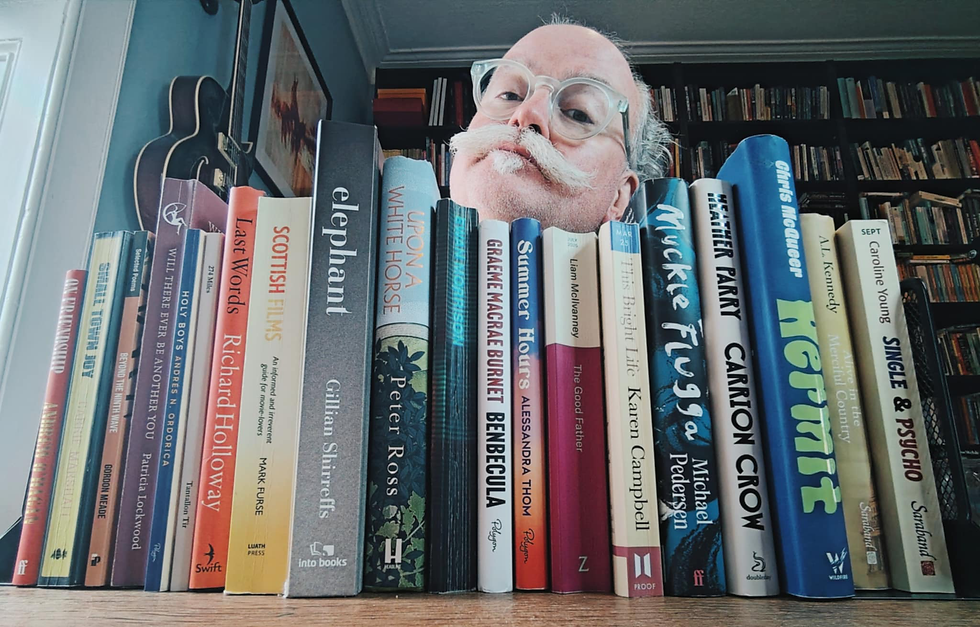Remembrance Of Things Past – Part 1: A Review Of Charlie Laidlaw’s The Space Between Tim
- Alistair Braidwood

- Sep 19, 2019
- 4 min read
Updated: May 7, 2021

There are notable examples of films with the same theme being released roughly at the same time. Two Robin Hood movies appeared in 1991 (Kevin Costner’s Prince of Thieves & the lesser-known Robin Hood, with Patrick Bergen in the lead role), two asteroid disaster movies opened within a month of each other in 1998 (Deep Impact & Armageddon), and within months of each other in 1998 -’99 there were two excellent adaptations of Chloderos Laclos’ novel Les Liaisons Dangereuses (Valmont & Dangerous Liaisons), and that’s without even mentioning the volcano film-fad of 1997.
It’s perhaps more rare in literature, but it so happens that there were two Scottish novels published this summer which take the unreliable narration of memory and individual responsibility as two of their central themes. One is a novel from David Cameron (no, not that one) called Prendergast’s Fall (Into Books) which will be reviewed on these pages in the near future, but first I want to discuss Charlie Laidlaw’s latest novel The Space Between Time (Accent Press Ltd).
One of the reasons for the existence of Scots Whay Hae! is to bring to your attention artists, musicians, and writers who deserve to be better known but who are finding it increasingly difficult to be heard. One of those is undoubtedly Charlie Laidlaw, whose novel The Things We Learn When We’re Dead was one of the most interesting and inventive of recent years, and about which SWH! said “..it will have you reflecting on your own past, present and possible future”.
The Space Between Time has similar concerns. It looks back at the life and times of Emma Maria Rossini, a girl who, to the outside world, seems to have it all. Her father is an A-List film star, hanging and working out with the likes of Tom Cruise and Sandra Bullock, and featuring in the list of ‘The World’s Top 20 Sexiest Men, although “only number 18” as his beleaguered wife comments. It’s a small moment but one which indicates how Emma’s mother struggles to cope with her husband’s level of fame. This feeling translates to their daughter who sees it as the central reason that family life has come to be unfulfilled and often unhappy.
As her adult life progresses, fairly unspectacularly, Emma continues to be tied to the past, changing her name and hiding her identity from others in an attempt to be judged on her own merits. But those ties bind fast and she never manages to escape fully. Most of us have moments in our life that come to be seen as defining, but can they be trusted? Are they pure memory, learned stories told to us repeatedly over the years, or, perhaps most likely, a mixture of both?
Emma remembers a traumatic trip to the cinema that comes to define the distance between her life with her mother and that of her often absent father, both physically and emotionally. Add to that a family picture which, on reflection, disproves the saying that “the camera never lies”, and other childhood reminiscences which are less than reliable, and it becomes clear that Emma’s past does not necessarily reflect the narrative created.
Her mother’s tragic death offers another puzzle where all may not be as it seems. Questions are not only asked about individual motives, but how feelings of responsibility, guilt, and grief in others are linked to those – the version of a story you choose to believe often being as selfish as it is prudent. Laidlaw once again asks readers to consider just how reliable their own memories are and should other possible narratives be considered. There is even the suggestion that our lives are little more than a collection of stories which we either choose to believe or dismiss.
However, The Space Between Time offers hope for the future no matter the tricks and tribulations of the past. As Emma begins to understand more about her family history she begins to learn more about herself. Pictures, events, and remembrances are reappraised and a different story emerges, one which will have the reader returning to the book’s earlier sections to see if they could have read them differently.
It’s a novel which also examines the nature of fame, atheism, philosophy and science (Emma’s grandfather’s theorem on the nature and substance of the universe brings him his own version of fame in later life, something she draws comfort from). It’s a lot to take on, and some strands are less successful than others, but what holds everything together is the strength of the central characters. Despite their differences you have empathy with Emma, both her parents, and her grandfather, which is some achievement when you take into account how divided they appear, and how Emma’s perception of them changes.
With The Space Between Time Charlie Laidlaw has proven once again he is a writer of whom to take note. He writes literary fiction that is serious in its intention, yet has a humanity, a knowing sense of humour, and a warm heart that makes you feel as well as think, and there’s little more you can ask from any novel.
Charlie Laidlaw’s The Space Between Time is published by Accent Press Ltd.









Comments